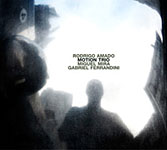Home » Jazz Articles » Album Review » Rodrigo Amado: Motion Trio
Rodrigo Amado: Motion Trio
It's not that the images are entirely depictive, nor are the tumbling, keening tenor phrases that recall a jollier Sonny Rollins or Archie Shepp. But there's a hungry liveliness amid the bustling contemporary whimsy of both Searching for Adam (a recent Amado exhibition of New York photos) and the saxophonist's music. Exclusively on tenor, he's joined on Motion Trio by cellist Miguel Mira and drummer Gabriel Ferrandini for six collective improvisations. In Amado's images, the consistent result is finding detail and personality in the bustling hodgepodge of modern life. Free improvisation can offer similarities—a tremendous wealth of activity sometimes in opposition, at other instances merging in perfect sync. But the expert improviser exhibits individuality and poise, as well as a structuring sense of detail.
"Language Call" opens the set, Amado's tenor recalling the West Indian lilt of Rollins or moments of Ornette Coleman's Ornette on Tenor (Atlantic, 1962), as Ferrandini produces dampened flits in loose micro-activity parallel to the leader's horn. Amado has a broad sound, gritty and searching amid pithy elaborations. Rather than the blowsy tenor approach aligned with post-Albert Ayler Europeans, cadent tension and declamatory repetition mark a phraseology fitting in a melodically stable, rhythmically free context. The use of a cello rather than bass in a supporting role is interesting, and gives the music fleetness amid a narrower range. "Testify!" exemplifies a somewhat laconic, syrupy approach at the outset, bluesy flecks and singsong particles splaying out and becoming hard-bitten as Ferrandini and Mira roll and hack in a decidedly event-oriented approach to rhythm. Given to a duo three minutes in, their wood and metal spar offer curious contrast to Amado's velvety punches.
The detailed activity of skittering European free improvisation is certainly here amid snare patter, muted and bashed gongs, and guttural cello thwack, but Amado's tenor playing is so earthy in its concreteness that the group's motion remains highly traditional even at its most explosive. Not a power trio in the usual sense, Amado, Mira and Ferrendini present a distinctive fluidity both prickly and warm in this series of inviting abstractions.
Track Listing
Language Call; Testify!; Radical Leaves; As We Move...; Ballad; In All Languages.
Personnel
Rodrigo Amado
saxophoneRodrigo Amado: tenor saxophone; Miguel Mira: cello; Gabriel Ferrandini: drums.
Album information
Title: Motion Trio | Year Released: 2010 | Record Label: European Echoes
< Previous
Soldier Of Love
Next >
The Nature Of Love
Comments
About Rodrigo Amado
Instrument: Saxophone
Related Articles | Concerts | Albums | Photos | Similar ToTags
For the Love of Jazz
 All About Jazz has been a pillar of jazz since 1995, championing it as an art form and, more importantly, supporting the musicians who create it. Our enduring commitment has made "AAJ" one of the most culturally important websites of its kind, read by hundreds of thousands of fans, musicians and industry figures every month.
All About Jazz has been a pillar of jazz since 1995, championing it as an art form and, more importantly, supporting the musicians who create it. Our enduring commitment has made "AAJ" one of the most culturally important websites of its kind, read by hundreds of thousands of fans, musicians and industry figures every month.



















